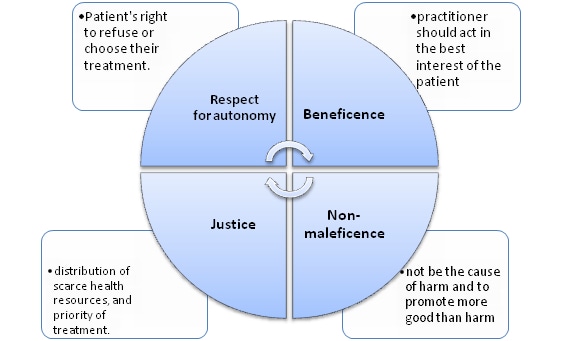- Filter By :
- Theoretical Questions
- Case Studies
-
Q. What do you understand by medical ethics? Examine its relevance in the context of deteriorating patient-physician relationship in India. (150 words)
10 Oct, 2019 GS Paper 4 Theoretical QuestionsApproach
- Define medical ethics.
- Mention the issues concerning the doctor-patient relationship.
- Explain how ethical conduct can improve this relationship.
Introduction
Medical ethics deals with the right choices of conduct in the field of human health. It deals with the distinction between what is considered right or wrong at a given time in a given culture. Medical ethics is concerned with the obligations of the doctors and the hospital to the patient along with other health professionals and society.
The four principles of medical ethics are
Body
Several aspects of medical ethical standards include clinical trials, manufacturing of medicines, prescription of medicines, medical education, the role of institutions in health sector, etc. There are many ethical standards already adopted such as:
- Clinical standards
- Medical code of ethics for doctors
- Standard operating procedure for hospitals
- Practice of medical board to take important decisions
Issues concerning the deteriorating patient-physician relationship in India:
- Rising commercialization: This results into loss of trust between doctor and patients.
- For ex: doctors of government hospitals doing private practice and charging patients hefty fees.
- Malpractices by doctors: There are several cases of lack of ethical standards in behaviour of hospitals and doctors, prescription of unnecessary tests, violation of ethics in clinical trials, etc.
- For ex: involvement of senior doctors of Apollo hospitals in organ trade racket.
- Inappropriate behaviour of patient’s family: Frequent cases of assault on doctors after loss of lives by the deceased family is making doctors reluctant to serve in public hospitals.
- The recent protest by resident doctors in Kolkata which resulted in nationwide strike after a junior doctor was assaulted.
- Scarcity of resources: Doctors in public hospitals are overburdened and work in stressful conditions. Also, it is the doctors who have to face public anger in case of any mishappening.
- For ex: in the Gorakhpur incident where hundreds of children died, doctors faced public backlash.
Steps to be taken to improve the condition
- Medical humanitarianism: The morale of the doctors needs to be boosted. Regular trainings and support should be given to imbibe the feeling of sympathy and compassion among doctors.
- Need for respectful interaction: Doctors should be encouraged to effectively communicate with the patients to instill confidence in them. Doctors should be aware of patient’s medical history, habits and routines for effective treatment, thus reviving the culture of ‘family doctors’.
- Focus on Emergency Medicine (EM): Introducing dedicated and trained EM residents who are sensitized and taught to handle tough situations, charged relatives, and “breaking bad news” is the need of the hour to enable better handling of emergency rooms and trauma centers.
- Strict enforcement of guidelines, code of ethics: There is an increasing need for culturally sensitive physicians and ethical committees in hospitals and other healthcare settings.
- Imbibing confidence among the doctors: Doctors must be assured of their safety and security. Steps like having security guards, installing CCTV cameras, pasting chart of guidelines for patient’s kin on hospital walls in regional language, etc should be initiated by hospital management.
Conclusion
The doctor–patient relationship is one based on mutual trust and respect between the two parties. However, the rapid changes in the medical field and the corporatization of health-care system have strained the age-old good relations between the patient and the doctors. Thus, there is a need to uphold the legal, ethical, and moral liabilities for both the doctors and the patients. Few of the Gandhi’s Seven Sins – ‘commerce without morality’ and ‘science without humanity’ highlight the need for reviving the spirit of medical ethics in India.
To get PDF version, Please click on "Print PDF" button.
Print PDF





